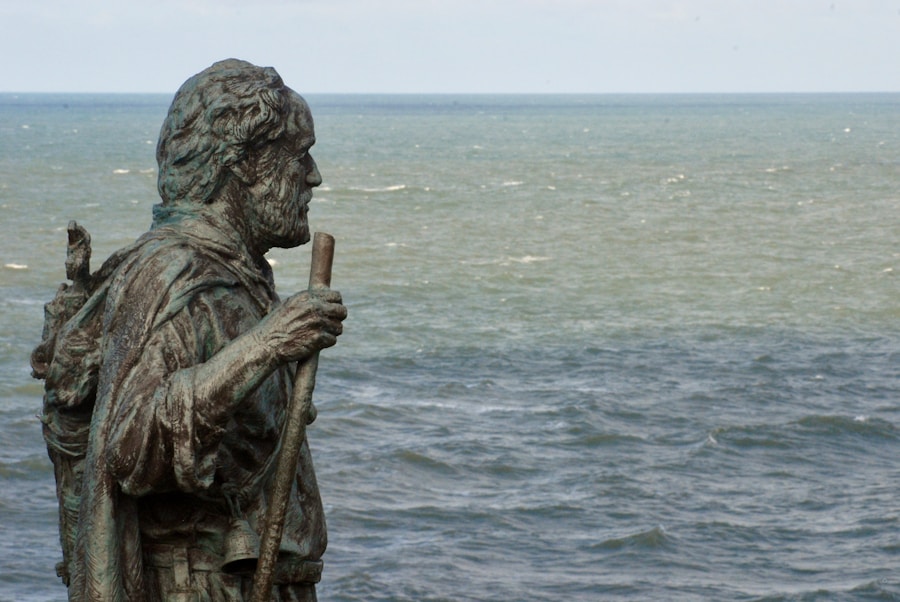Matthew Arnold, a prominent figure in Victorian literature, was not only a poet but also a cultural critic and educationalist. Born in 1822, Arnold was the son of the headmaster of Rugby School, which significantly influenced his intellectual development. His literary career spanned several decades, during which he produced a body of work that reflected the complexities of the human experience in a rapidly changing world.
Among his most celebrated works is “Dover Beach,” a poem that encapsulates his concerns about the erosion of faith and the existential uncertainties of modern life. “Dover Beach,” written in 1851, is a lyrical meditation that employs the imagery of the sea to explore profound philosophical questions.
The poem begins with a serene description of the English Channel at Dover, but as it unfolds, it reveals a deeper sense of melancholy and disillusionment. Arnold’s use of vivid imagery and sound creates an emotional resonance that invites readers to reflect on their own beliefs and the nature of human existence. The poem’s structure, with its alternating rhythms and varied line lengths, mirrors the ebb and flow of the sea, reinforcing the themes of change and uncertainty that permeate Arnold’s work.
Key Takeaways
- Matthew Arnold’s “Dover Beach” is a renowned poem that reflects the poet’s contemplation on the decline of faith and the erosion of traditional values in the modern world.
- The poem’s themes revolve around the contrast between the beauty of the natural world and the uncertainty and disillusionment of human existence, as well as the loss of faith and the search for meaning in a changing world.
- “Dover Beach” explores the role of faith in providing stability and comfort in the face of existential doubt, highlighting the poet’s struggle with the decline of religious belief and the resulting sense of isolation and despair.
- The historical and cultural context of the poem is rooted in the mid-19th century, a time of significant social and intellectual upheaval, marked by the erosion of religious certainty and the rise of scientific and industrial advancements.
- The impact and legacy of “Dover Beach” lie in its enduring relevance, as it continues to resonate with readers today, prompting reflection on the enduring human struggle to find meaning and faith in an ever-changing world.
Analysis of the Poem’s Themes
At its core, “Dover Beach” grapples with the theme of faith and its decline in the face of modernity. The poem opens with a tranquil scene, where the speaker invites his beloved to listen to the sound of the waves. This initial calmness serves as a stark contrast to the underlying turmoil that follows.
As the speaker reflects on the “eternal note of sadness” that accompanies the beauty of the sea, he articulates a profound sense of loss. The imagery of the sea becomes a metaphor for the shifting tides of belief and certainty, suggesting that just as the waves recede, so too does faith in a stable moral order. Another significant theme in “Dover Beach” is the isolation and loneliness that accompany modern existence.
The speaker’s lamentation over the fading light of faith is not merely a personal reflection but also a commentary on the broader human condition. The poem suggests that as society moves away from religious certainties, individuals are left adrift in a world devoid of clear moral guidance. The lines “We are here as on a darkling plain / Swept with confused alarms of struggle and flight” encapsulate this sense of disorientation.
The imagery evokes a battlefield where individuals grapple with their fears and uncertainties, highlighting the existential crisis that arises when traditional sources of meaning are called into question.
The Role of Faith in the Poem

Faith plays a pivotal role in “Dover Beach,” serving as both a source of comfort and a point of contention for the speaker. Initially, the poem evokes a sense of peace associated with nature and love, yet this tranquility is soon overshadowed by an awareness of faith’s fragility. Arnold’s reference to “the Sea of Faith” suggests that faith once surrounded humanity like a protective barrier, providing solace and certainty.
However, as the poem progresses, it becomes evident that this sea is receding, leaving individuals exposed to the harsh realities of life without the buoyancy of belief. The decline of faith is not merely an abstract concept in Arnold’s work; it has tangible implications for human relationships and emotional well-being. The speaker’s plea for his beloved to remain close reflects a desire for connection in an increasingly isolating world.
The invocation of love amidst despair underscores the idea that while faith may be waning, human relationships can still offer solace and meaning. Yet, this reliance on personal connections also raises questions about their sufficiency in providing lasting comfort. The tension between individual love and collective belief highlights Arnold’s struggle to reconcile personal fulfillment with broader existential concerns.
Historical and Cultural Context of the Poem
“Dover Beach” was written during a period marked by significant social and scientific upheaval in Victorian England. The mid-19th century was characterized by rapid industrialization, urbanization, and advancements in scientific thought, particularly Darwin’s theory of evolution. These developments challenged traditional religious beliefs and prompted many to question established doctrines.
Arnold’s poetry reflects this cultural milieu, as he grapples with the implications of a world increasingly defined by skepticism and rationalism. The poem can also be seen as a response to the Romantic movement that preceded it. While Romantic poets often celebrated nature as a source of inspiration and transcendence, Arnold adopts a more ambivalent stance.
The beauty of nature in “Dover Beach” is tinged with sadness, suggesting that even amidst aesthetic pleasure lies an awareness of existential despair. This shift from Romantic idealism to a more somber reflection on human existence marks Arnold’s unique contribution to Victorian literature. His work serves as a bridge between Romanticism and modernism, capturing the tensions between faith and doubt that would continue to resonate in subsequent literary movements.
Impact and Legacy of Dover Beach
“Dover Beach” has left an indelible mark on both literature and cultural discourse since its publication. Its exploration of themes such as faith, love, and existential uncertainty has resonated with readers across generations. The poem’s poignant imagery and emotional depth have inspired countless interpretations and adaptations in various artistic forms, including music, visual art, and theater.
Notably, its influence can be seen in the works of later poets such as T.S. Eliot and W.H. Auden, who grappled with similar themes in their own writing.
The legacy of “Dover Beach” extends beyond its literary significance; it has also become emblematic of the broader cultural anxieties surrounding faith in modern society. In an age marked by rapid technological advancement and shifting moral landscapes, Arnold’s reflections on belief continue to resonate with contemporary audiences. The poem serves as a reminder of the enduring human quest for meaning amidst uncertainty—a theme that remains relevant in today’s increasingly secular world.
Relevance of the Poem in Today’s Society

The relevance of “Dover Beach” in today’s society cannot be overstated. As individuals navigate an era characterized by information overload and existential questioning, Arnold’s exploration of faith and doubt offers valuable insights into the human experience. The poem’s meditation on love as a potential refuge amidst uncertainty speaks to contemporary concerns about connection in an increasingly fragmented world.
In an age where traditional sources of meaning are often challenged or discarded, Arnold’s work encourages readers to reflect on their own beliefs and relationships. Moreover, “Dover Beach” serves as a poignant reminder that while faith may ebb and flow like the tides, the search for understanding and connection remains a fundamental aspect of human existence. As society grapples with issues such as moral relativism, technological alienation, and spiritual dislocation, Arnold’s reflections continue to resonate deeply.
In a related article to Matthew Arnold’s Dover Beach: A Reflection on Faith, readers may find Strategies for Effective Reading of Academic Texts to be helpful in analyzing and interpreting the complex themes and messages within the poem. This article offers valuable insights on how to approach and understand challenging literary works, providing readers with the tools needed to delve deeper into the meaning and significance of Arnold’s contemplation on faith and the human condition.
























+ There are no comments
Add yours